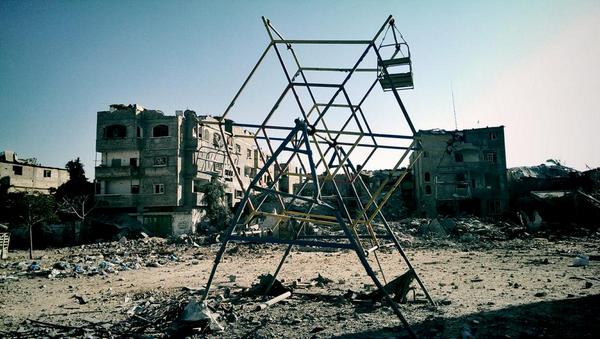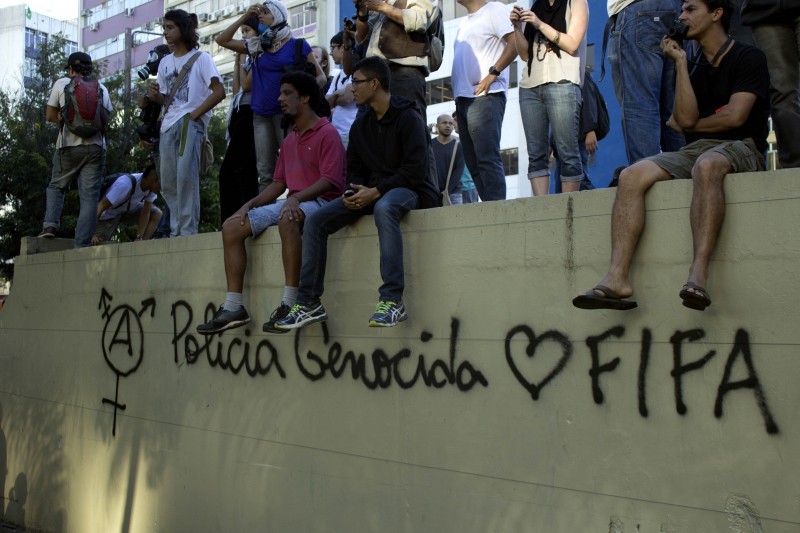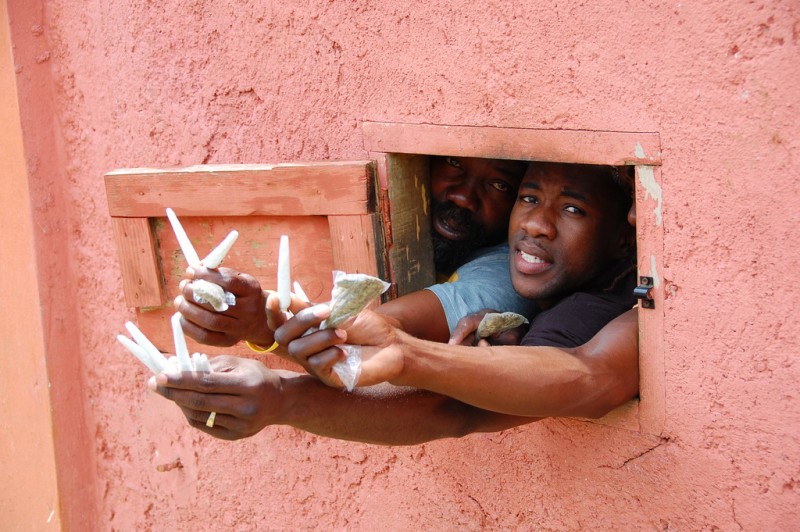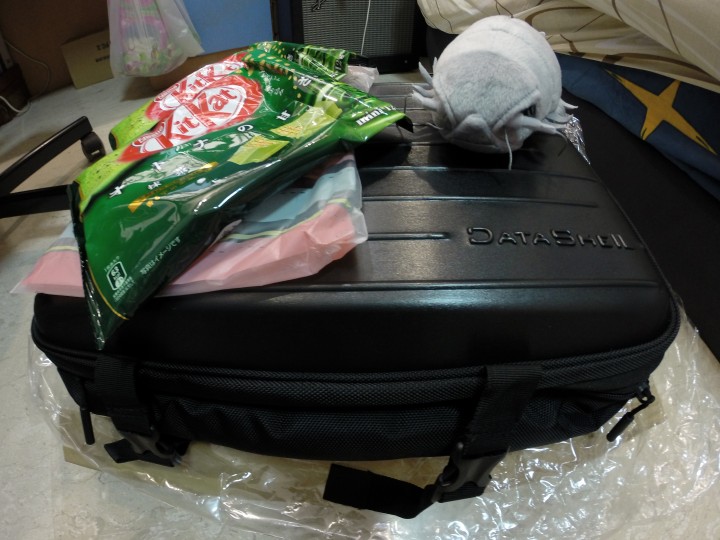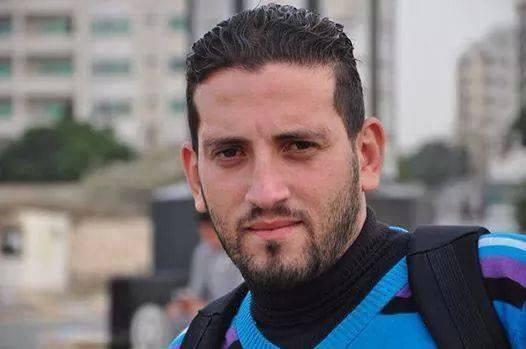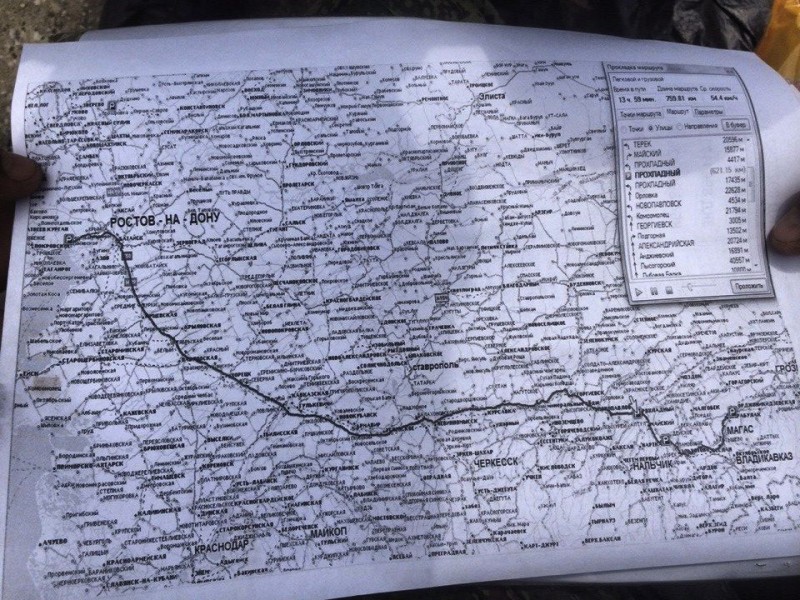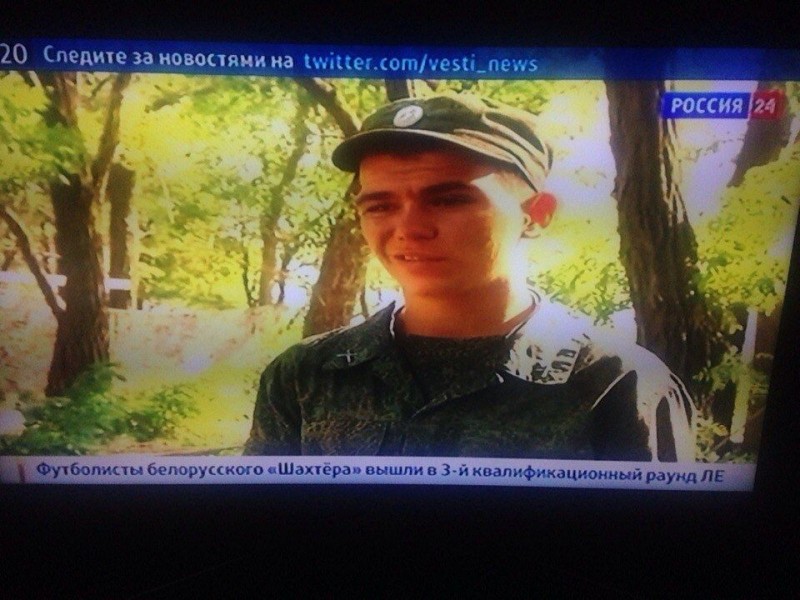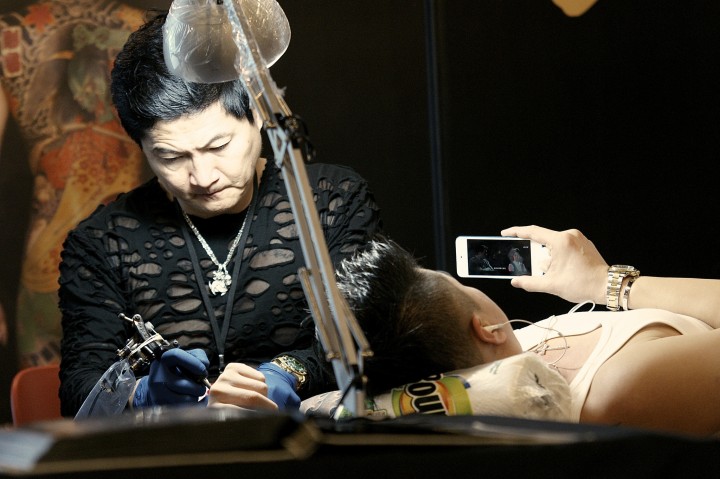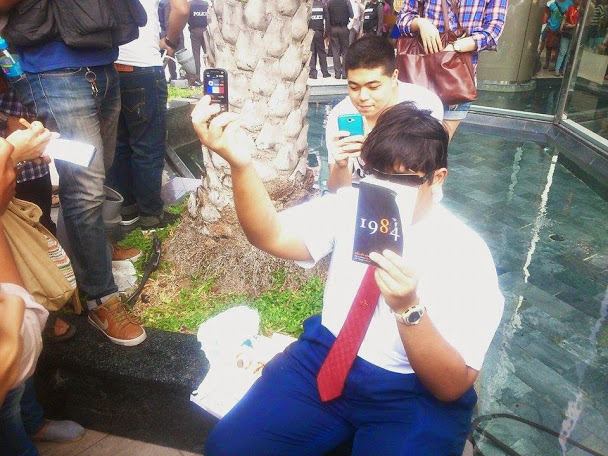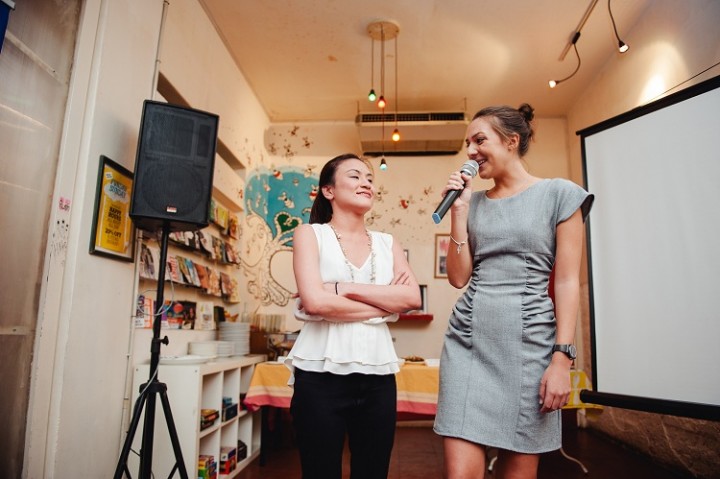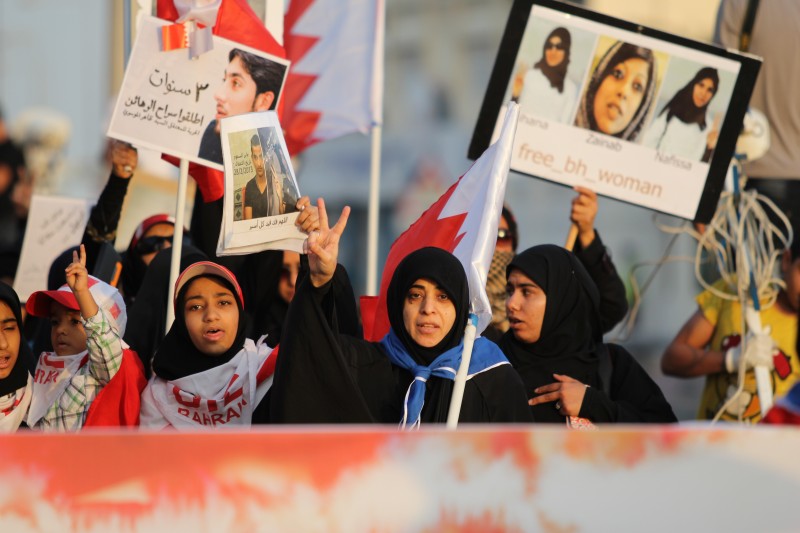
A opposition rally near Manama, Bahrain, on November 22, 2013. Photo by Sayed-Baqer. Copyright Demotix.
With Bahrain's next elections coming up in November, the ruling regime has altogether taken its gloves off in terms of political intimidation.
For years, the small oil-rich kingdom, which is a major ally to the United States, has received criticism for human rights abuses targeting dissidents. In 2011, the military launched a bloody crackdown on protests demanding more political rights from the ruling Al Khalifa family. Low-level protests have continued to simmer.
Slapping, kicking and other forms of physical violence were found to be part of the government's systematic mistreatment or torture of political opponents since the 2011 uprising, according to the government-appointed Bahrain Independent Commission of Inquiry.
So a recent tweet from the country's Minister of Justice Khaled Al Khalifa talking about a “political bitch-slap” against the secretary-general of Al Wefaq Ali Salman, Bahrain's largest opposition political society, ahead of parliamentary elections was not taken lightly:
عندما خرج السياسي المنكوب ليقول نريد (ديمقراطية توافقية بين الطوائف) عرضنا عليه 666 كفا سياسيا جزاء طائفيته. والآن يبدو أنه يريد المزيد.
— Bu Abdullah (@Khaled_Bin_Ali) July 23, 2014
When the wrecked politician came out and proposed a (cross-sect consensual democracy), we offered him a 666 political slap in reward for his sectarianism. It seems he's asking for more now.
The minister of justice is in charge of the island's political societies; Bahrain bans the term “party” because it indicates an entity that seeks to change the government. The “wrecked politician” refers to Salman, the head of Al Wefaq, who lately disclosed a secret government offer that included dividing the next cabinet into three parts — six Shiite ministers, six Sunni ministers and six ministers from the royal family. Salman had offered to negotiate based on a solution that would be accepted by the country's two largest sects (Sunnis and Shia) in order to put an end to the political crisis.
Al Wefaq refused the offer, and the Bahraini regime responded by suspending all of the political society's activities till further action for “violating the rules of the general assembly”. This comes soon after an American diplomat was kicked out of Bahrain after he met with Al Wefaq officials.
With the upcoming elections, which are considered pivotal for both sides, this move might curb the ability of the opposition to arrange massive protests like the ones of previous years.
The elections, which are set to take place on October 23, 2014, will be the third since the establishment of the parliament in 2002. Forty candidates will be elected to the legislative lower house, while another 40 will be selected by the king to represent the upper house of the legislative division. The lower house has very limited powers as it is overseen by the upper house (called the Consultative or Shura Council), the prime minister and the king.
One of the conditions Al Wefaq set to participate is to have a fully elected legislative parliament. Al Wefaq had the majority of votes in the last elections in 2010 before it withdrew after armed forces brutally repressed and killed pro-democracy protesters in early 2011. By-elections were held to fill the seats of the resigned members and the opposition boycotted it, leading to a participation level of 17.4 per cent, a figure that showed how unpopular the regime was at that moment.
The second largest opposition group, secular nationalist group the National Democratic Action (WAAD, in Arabic), is also being targeted ahead of elections. It was listed as one of the opposition groups violating government regulations because it refused to expel its leader, Ebrahim Sharif, who is now imprisoned for joining the protests in 2011.
The government is filing a lawsuit against the political society. The country's judicial system was blasted for failing “to deliver basic accountability and impartial justice” in a recent Human Rights Watch report.
Minister of Justice Khaled Al Khalifa explained on Twitter to his more than 38,000 followers his version of what could be the solution for Al Wefaq. The tweets hinted that one of the goals is to change Al Wefaq's leadership:
تم اختطاف الجمعية بتفسير شاذ بنظامها الداخلي أدى الى تهميش المؤتمر العام وسيطرة بعض الأشخاص على اجهزة الجمعية عن طريق ما يسمى بالتزكية
— Bu Abdullah (@Khaled_Bin_Ali) July 20, 2014
The society was hijacked by a deviant interpretation of its code, which led to the marginalization of its general assembly and the control of few people by what is called unopposed candidates
السبيل الصحيح الوحيد لتلك الجمعية هو ان تدعو لمؤتمر عام لانتخاب القائمين عليها بشكل شفاف وإجراءات صحيحة وتنهي حالة فوضى الزعامات داخلها.
— Bu Abdullah (@Khaled_Bin_Ali) July 20, 2014
The only right path for that society is to call for a general assembly to elect its leaders in a transparent way and with the correct procedure and to end the internal leadership chaos
Al Wefaq's general secretary responded to the minister in a press conference, saying that they received an offer from the government to accept ministerial positions in exchange for stopping the protests. He also said that Al Wefaq refused because it will not grant the people the power to participate in decision making.
Al Wefaq's Twitter account, which has more than 182,000 followers, tweeted the conference:
الأمين العام في المؤتمر الصحفي: نقول بالمناسبة في أي انتخابات تجريها الوفاق داخلياً مرحبا بالأمم المتحدة، مرحباً بمؤسسة كارتر وغيرها
— Alwefaq Society (@ALWEFAQ) July 21, 2014
The general secretary in the press conference: By the way, we declare that in any internal elections Al Wefaq holds we welcome the United Nations, we welcome the carter foundation and any others as observers
الأمين العام في المؤتمر الصحفي:اذا أردتم أن تروا شعبيةالوفاق أعطونا الملعب الوطني لاجراء مؤتمرنا العام،هذا اذا كان الملعب الوطني يسع جمهورنا
— Alwefaq Society (@ALWEFAQ) July 21, 2014
The general secretary in the press conference: if you want to see how popular Al Wefaq is then let us hold our general assembly in the national stadium, that is, if the national stadium would be able to hold our audience
الأمين العام في المؤتمر الصحفي: الطرح المعارض يريد دوائر عادلة، الطرح الرسمي لا يمكن اجراء انتخابات بدوائر عادلة، #Bahrain
— Alwefaq Society (@ALWEFAQ) July 21, 2014
The general secretary in the press conference: The opposition propose an equal distribution of electoral districts, the official response is you can't hold elections with equally distributed electoral districts
Gerrymandering to favor the ruling party has been one of the points that Bahrain's opposition have longed complained about. This table (Google translation) shows how the parliamentary seats would have been distributed among districts if equal votes are to be used in comparison with the current distribution.
الأمين العام في المؤتمر الصحفي:الطرح المعارض نريد حكومة منتخبة، الطرح الرسمي لا يمكن الحصول على حكومة منتخبة #Bahrain
— Alwefaq Society (@ALWEFAQ) July 21, 2014
The general secretary in the press conference: The opposition propose an elected government, the official response is you can't have an elected government
الأمين العام في المؤتمر الصحفي: الطرح المعارض نريد مجلس كامل الصلاحيات، الطرح الرسمي لا يمكن.. هذا العرض المقدم وقد رفضناه #Bahrain
— Alwefaq Society (@ALWEFAQ) July 21, 2014
The general secretary in the press conference: The opposition propose a fully elected legislative parliament, the official response is you can't have a fully elected legislative parliament
الأمين العام في المؤتمر الصحفي: نحن نتحدث عن حل الأزمة بشكل شامل لا يبقي شيئاً لينفجر بعد شهر أو شهرين، #Bahrain
— Alwefaq Society (@ALWEFAQ) July 21, 2014
The general secretary in the press conference: We are proposing a solution that will put an end to the crisis for good and leaves nothing to explode in a month or two.
الأمين العام في المؤتمر الصحفي:لا مشاركة لا من تحت الطاولة ولا من فوق الطاولة،ودعوة للشعب لمقاطعة الانتخابات النيابية والبلدية #Bahrain
— Alwefaq Society (@ALWEFAQ) July 21, 2014
The general secretary in the press conference: We will not participate in anyway in the elections, not publicly nor secretly, and we call on all the people to boycott the parliamentarian and municipal elections
Popular human rights activist and ex-prisoner Nabeel Rajab summed up for his 232,000 what the government might do between now and the elections:
الان وحتى الانتخابات القادمة يتوقع ان يقوم النظام بالكثير من الممارسات الجنونية التي تهدف لإضعاف القوى السياسية لكن ثبات الشعب سيكون الحاسم
— Nabeel Rajab (@NABEELRAJAB) July 22, 2014
Now until the next elections we expect the regime to take insane procedures to weaken the political powers, but the resilience of the people will be the determining factor
Written by Noor Mattar
· comments (0)
Donate
· Share this: twitter facebook reddit googleplus
